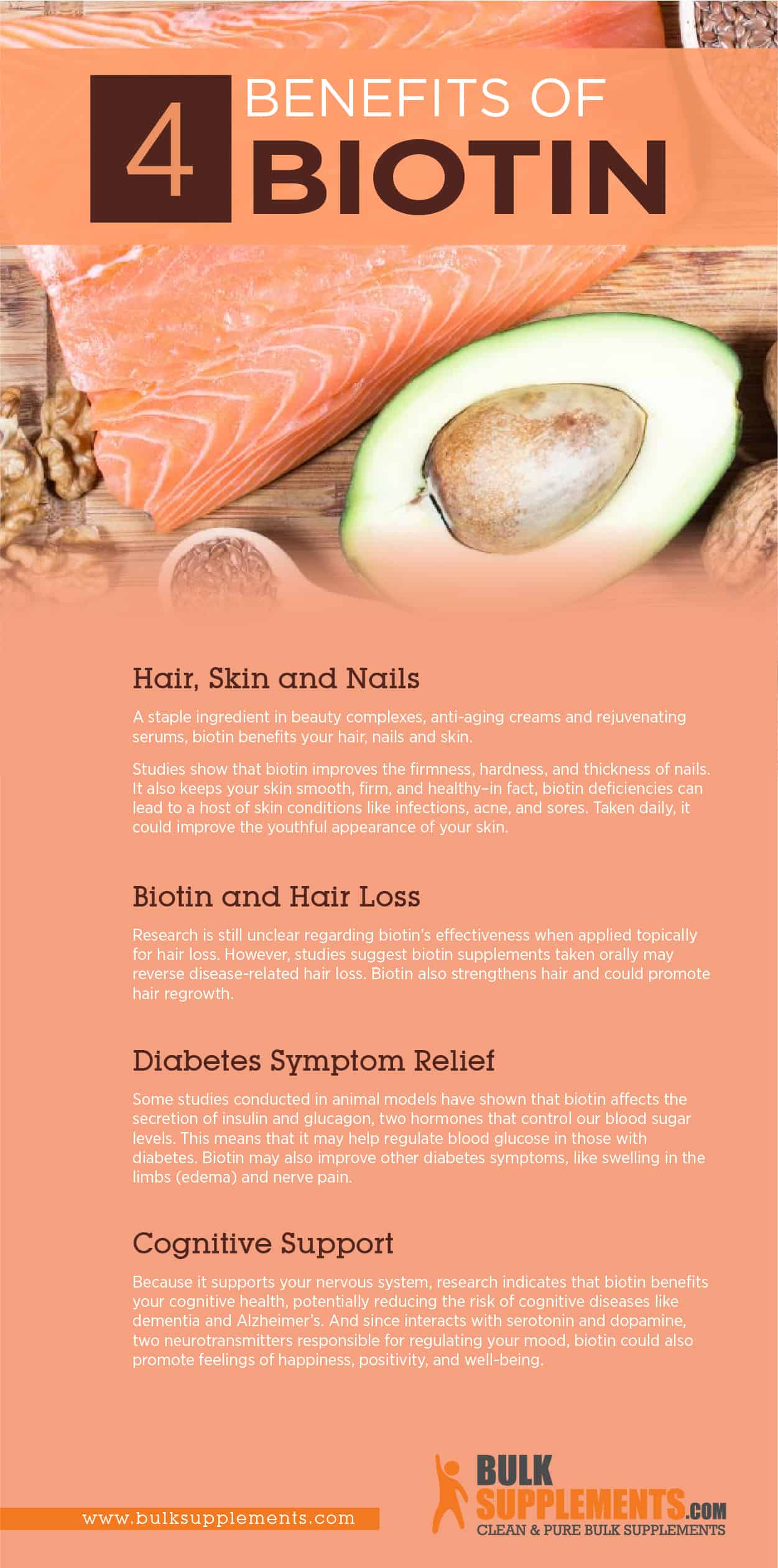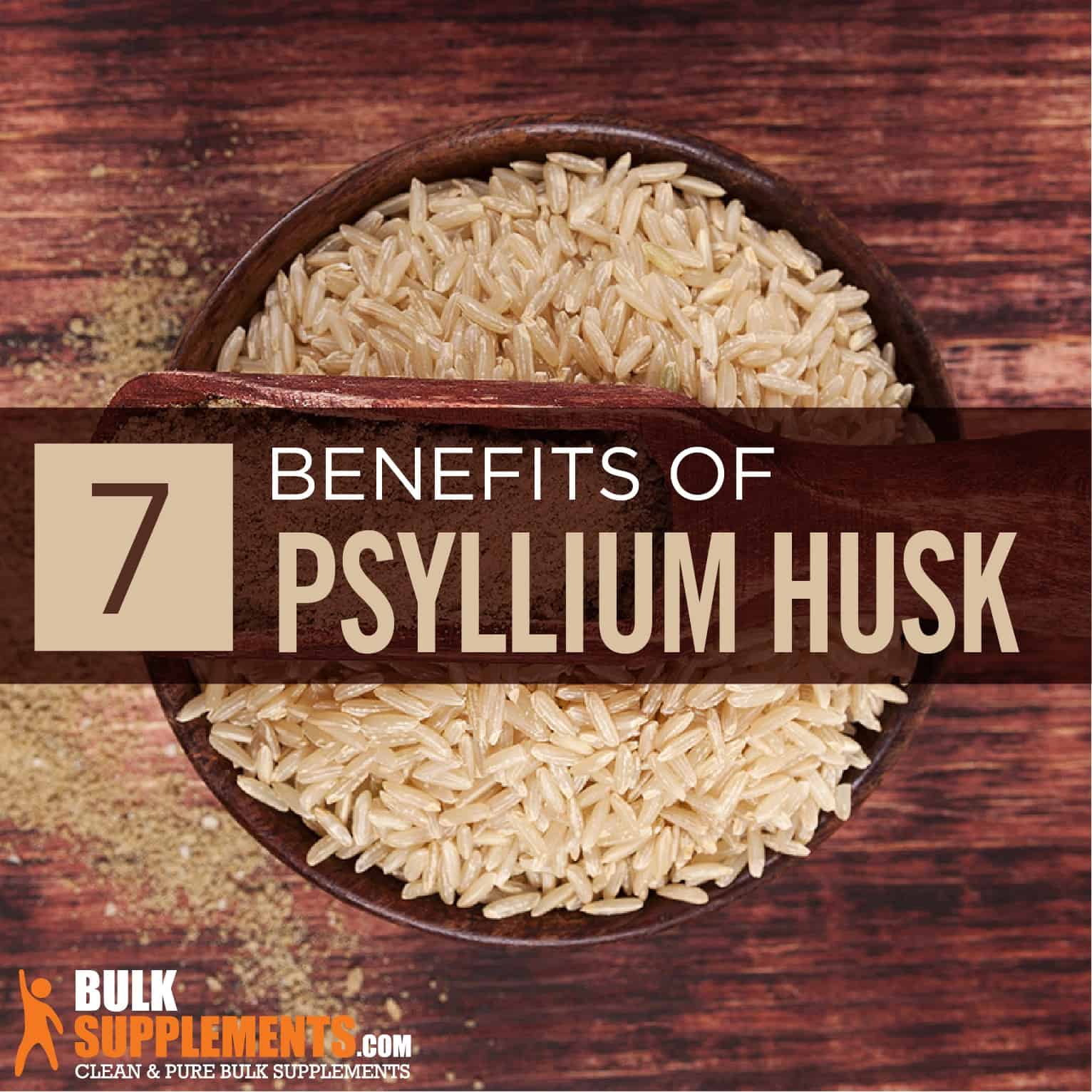Biotin Benefits, Side Effects and Dosage

Biotin
What is Biotin?
Biotin, also known as vitamin B7, is a water-soluble vitamin that plays a vital role in metabolism, gene regulation, and cell signaling. It’s a type of vitamin called a co-factor, meaning it helps enzymes break down fatty acids, glucose and amino acids so your body can function properly.
While biotin gained fame as a beauty booster, it does more than keep your hair, nails and skin healthy.
So why should you add biotin to your supplement routine?
Biotin Benefits
Hair, Skin and Nails
A staple ingredient in beauty complexes, anti-aging creams and rejuvenating serums, biotin benefits your hair, nails and skin.
Studies show that biotin improves the firmness, hardness, and thickness of nails. It also keeps your skin smooth, firm, and healthy–in fact, biotin deficiencies can lead to a host of skin conditions like infections, acne, and sores. Taken daily, it could improve the youthful appearance of your skin.
Biotin and Hair Loss
Research is still unclear regarding biotin’s effectiveness when applied topically for hair loss. However, studies suggest biotin supplements taken orally may reverse disease-related hair loss. Biotin also strengthens hair and could promote hair regrowth.
Diabetes Symptom Relief
Some studies conducted in animal models have shown that biotin affects the secretion of insulin and glucagon, two hormones that control our blood sugar levels. This means that it may help regulate blood glucose in those with diabetes. Biotin may also improve other diabetes symptoms, like swelling in the limbs (edema) and nerve pain.
Cognitive Support
Because it supports your nervous system, research indicates that biotin benefits your cognitive health, potentially reducing the risk of cognitive diseases like dementia and Alzheimer’s. And since it interacts with serotonin and dopamine, two neurotransmitters responsible for regulating your mood, biotin could also promote feelings of happiness, positivity, and well-being.

How Much Biotin Do You Need?
Biotin is an essential nutrient, meaning that our bodies cannot produce enough of it on its own. The amount of biotin we need every day increases as we age:
Age
Male
Female
Pregnancy
Lactation
Birth to 6 months
5 mcg
5 mcg
7–12 months
6 mcg
6 mcg
1–3 years
8 mcg
8 mcg
4–8 years
12 mcg
12 mcg
9–13 years
20 mcg
20 mcg
14–18 years
25 mcg
25 mcg
30 mcg
35 mcg
19+ years
30 mcg
30 mcg
30 mcg
35 mcg
Food Sources of Biotin
Meat, eggs and fish are the richest sources of biotin, but you can also find it in other foods, including those in a plant-based diet.
Biotin Food Sources
mcg per
serving
Beef liver, cooked, 3 ounces
30.8
Egg, whole, cooked
10.0
Salmon, pink, canned in water, 3 ounces
5.0
Pork chop, cooked, 3 ounces
3.8
Hamburger patty, cooked, 3 ounces
3.8
Sunflower seeds, roasted, ¼ cup
2.6
Sweet potato, cooked, ½ cup
2.4
Almonds, roasted, ¼ cup
1.5
Tuna, canned in water, 3 ounces
0.6
Spinach, boiled, ½ cup
0.5
Broccoli, fresh, ½ cup
0.4
Cheddar cheese, mild, 1 ounce
0.4
Milk, 2%, 1 cup
0.3
Plain yogurt, 1 cup
0.2
Oatmeal, 1 cup
0.2
Banana, ½ cup
0.2
Can You Have Too Much Biotin?
Biotin overdoses are extremely rare. Since studies haven’t reported any significant adverse health effects associated with high levels of biotin, there is currently no maximum daily limit.
However, consuming too much biotin can have adverse effects on the digestive system. Additionally, some laboratory tests use biotin to measure the amount of thyroid hormone circulating in our bodies. If you take too much biotin (far above the recommended dose), it skews these test results and can lead to the misdiagnosis of hyperthyroidism. To be on the safe side, always disclose to your doctor any supplements you have been taking before considering adding more to your diet.
SEE ALSO

Psyllium Husk: Benefits, Side Effects & Dosage
Biotin Side Effects
Biotin has few side effects and as long as you stick to the recommended dosage, it’s safe to take for healthy adults. Talk to your doctor before taking biotin if you’re nursing or pregnant. Since biotin could interfere with some laboratory test results, don’t take it before you get a blood test.
Biotin Supplements
You can find biotin supplements in many different forms. It’s one of the main ingredients in hair, skin and nail complexes and available as a capsule, tablet, or powder.
Biotin powder is a concentrated form of the vitamin and easy to add to your own customized nutrient blend. As a dietary supplement, take 100 mg daily, or as directed by physician. You’ll need a milligram scale to safely and accurately measure your dose.
The Bottom Line
An essential vitamin, biotin keeps your hair and nails strong and your skin youthful. It may also boost your mood, regulate blood sugar, and could help reduce your risk of developing diseases like Alzheimer’s.
With few side effects and science in its corner, biotin benefits multiple areas of your health and is easy to add to your diet.



